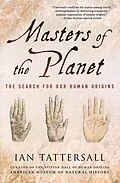50,000 years ago - merely a blip in evolutionary time - our Homo sapiens ancestors were competing for existence with several other human species, just as their own precursors had been doing for millions of years. Yet something about our species separated it from the pack, and led to its survival while the rest became extinct. So just what was it that allowed Homo sapiens to become Masters of the Planet? Curator Emeritus at the American Museum of Natural History, Ian Tattersall takes us deep into the fossil record to uncover what made humans so special. Surveying a vast field from initial bipedality to language and intelligence, Tattersall argues that Homo sapiens acquired a winning combination of traits that was not the result of long term evolutionary refinement. Instead it emerged quickly, shocking their world and changing it forever.
Autorentext
Ian Tattersall, PhD is a curator in the Division of Anthropology of the American Museum of Natural History in New York City, where he co-curates the Spitzer Hall of Human Origins. He is the acknowledged leader of the human fossil record, and has won several awards, including the Institute of Human Origins Lifetime Achievement Award. Tattersall has appeared on Charlie Roseand NPR's Science Friday and has written for Scientific American and Archaeology. He's been widely cited by the media, including The New York Times, BBC, MSNBC, and National Geographic. Tattersall is the author of Becoming Human, among others. He lives in New York City.
